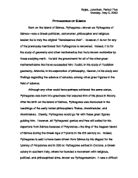Pythagoras of Sámos was by no means a one-sided individual—both in his personality and his philosophies. Pythagoras adhered to certain mysteries, similar in many respects to the Orphic mysteries. Obedience and silence, abstinence from food, simplicity in dress and possessions, and the habit of frequent self-examination were prescribed in his teachings. Thus, it seems as though these philosophies set the precedent for such movements as existentialism, romanticism and other medieval movements, such as that of the Goths. With these philosophies, Pythagoras was able to create many concepts with numbers and, ultimately, mathematics. Because of his religious teachings, which stated that heavenly bodies were separated by intervals of numbers (that is of a particular measurement) and that life exists in the harmony of spheres, Pythagoras was able to derive many complex mathematical formulas. Among the most prominent mathematical formulas is the Pythagorean Theorem, or Hypotenuse Theorem, which states that the length of one leg of a right triangle squared plus the length of the second leg of the same right triangle squared equals the length of the hypotenuse of the same right triangle squared. He was able to derive this equation from his study with prime, even and odd numbers, which later inspired the work of Fibonacci and his study of number series. Although the latter philosopher, Fibonacci, is accredited with many of the advancements in number series, it was actually Pythagoras who laid the original concepts and philosophies of number theory. Pythagoras set up a sequence of numbers that dealt with the repetition of specific functions applied to a number or numbers, which allowed him to believe that he was once the great Euphorbus, a warrior in the Trojan War. His ideals of reincarnation and astrology inspired him to study the universe and form various theories about it. Among the extensive mathematical investigations carried on by the Pythagoreans were their studies of odd and even numbers and of prime and square numbers. From this arithmetical standpoint they cultivated the concept of number, which became for them the ultimate principle of all proportion, order, and harmony in the universe. Pythagoras is unmistakably the father of thousands of fields in science—predominantly mathematics.
Having impacted the many fields of science, Pythagoras has had a great influence on the world today and the twenty-five hundred years past. Pythagoras’ philosophies are hardly evanescent; his endorsement of numbers in the “corporeal world,” as he dubbed it, maintain their impact on the world today. Modern astronomers and mathematicians have maintained that his proofs and theories are valid. For instance, it is accepted that the earth is spherical and that the planets of this galaxy circle the sun. Moreover, the Pythagorean Theorem is still accepted, unlike some of the theories proposed by other scientists, such as Avogadro. Though the latter theorem is the most popular—and thereby most widely taught—his most ingenious theorems are present in the study of calculus and advanced trigonometry. For instance, the Pythagorean identities are considered among the greatest discoveries of trigonometry, the base is as follows:
sin2 x + cos2 x = 1; this is the base from which other Pythagorean trigonometric identities can be derived. The use of these equations and identities are present throughout mathematics—the foremost being trigonometry and calculus. Through the use of these equations and Pythagoras’ other works came arguably the greatest equation known in architecture and engineering: The Golden Ratio.
The golden ratio is present throughout the world and is still utilized today. The number derivation is commonly known as phi, whose ratio rounds to 1.6180339887. This Golden Mean, Golden Ratio or Divine Proportion—however one may call it throughout history—known today as phi is largely accredited to Pythagoras or the Pythagoreans. It is the most influential and ubiquitous ratio in the world; evidence of its presence are found throughout the human body, in animals (the dolphin), shells, the rings of Saturn, human DNA, art (Da Vinci’s The Last Supper) and especially architecture. Pythagoras’ genius has succeeded him, as many of the great architectural wonders of the past and present—and likely future—feature some facet of the Golden Ratio. For instance, the Golden Ratio occurs in past magnificent edifices as Egypt’s Pyramids of Giza, Greece’s Parthenon and Paris’ Notre Dame. Present examples of Pythagoras’ Divine Proportion present themselves in the Petronas Towers, the United States’ Sears Tower of Chicago and the United Nations building near New York. Future examples are difficult to predict, as building plans often change; however, four of the six formally proposed plans for the reconstruction of the World Trade Center are primarily based on the Golden Ratio. Obviously, Pythagoras’ work has had a significant influence on the world today.
In summary, Pythagoras of Sámos was the paradigm of a prodigy. Through his studies and findings, the people of the world were able to further their understanding of mathematics and a plethora of other sciences. His genius accounts for the influence of most of the studies of the great mathematicians that superseded him, and many sciences were either founded or flourished because of Pythagoras’ works. Truly, it is because of Pythagoras that the world has made such technological advancements; without his influence, the sciences may have been in their primitive state as they were centuries ago.
Works Cited
-
A History of Mathematics and The Golden Ratio. . Date Accessed: 4-16-03. Date Created: 1999. ©1999-2003 The Evolution of Truth.
- Copernicus Agent 6.0 WebCrawler Edition. ©1993-2003 Copernicus Corporation. All Rights Reserved.
- Copernicus Open Directory Project & The Liberty Alliance.
©1995-2003 Copernicus Corporation. All Rights Reserved.
- Google Search Engine. ©1994-2003 Google Technologies Incorporated. All Rights Reserved.
-
Mathematicians of the Past. . Date Accessed: 4-16-03. Date Created: January 1999. ©1999-2003 School of Mathematics and Statistics: University of St Andrews, Scotland.
- Microsoft Encarta Reference Library 2003 DVD-Edition. ©1993-2003 Microsoft Corporation. All Rights Reserved.
- Microsoft Networks MSN Learning and Research Plus MSN-8 Edition. ©1995-2003 Microsoft Corporation. All Rights Reserved.







